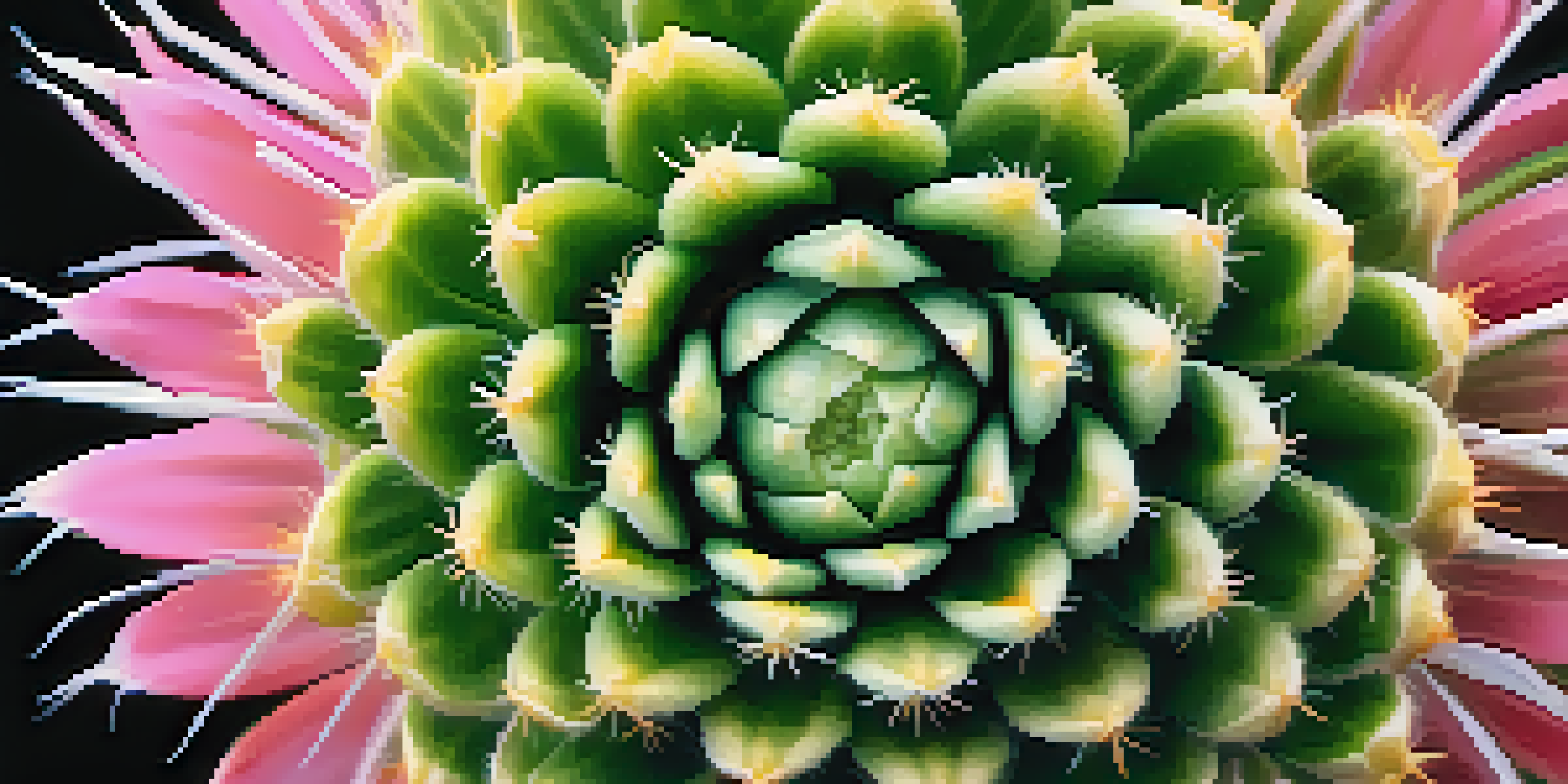Peyote vs. Other Psychedelics in Mental Health Treatment

Understanding Peyote and Its Active Component
Peyote is a small cactus native to Mexico and the southwestern United States, renowned for its psychoactive properties. The primary active ingredient in peyote is mescaline, a naturally occurring psychedelic compound. This cactus has been used for centuries in various indigenous cultures for spiritual and healing purposes, often in ceremonial contexts.
Psychedelics can play an important role in mental health treatment, helping to unlock the potential of our own minds.
When ingested, mescaline can induce profound changes in perception, mood, and consciousness. It’s not just about experiencing vivid visuals; many users report deep emotional insights and a sense of connection to the world around them. This unique experience has led researchers to explore its potential benefits for mental health treatment.
While peyote stands out for its historical and cultural significance, it’s essential to compare it to other psychedelics like psilocybin and LSD. Each substance has its own unique effects and therapeutic potential, prompting an interesting conversation about their roles in modern mental health treatment.
The Rise of Psychedelics in Mental Health Treatment
In recent years, there has been a resurgence of interest in psychedelics for mental health treatment. Studies have shown that substances like psilocybin and MDMA can provide relief for conditions such as depression, PTSD, and anxiety. This renewed focus is prompting a re-evaluation of traditional mental health therapies and their limitations.

Psychedelics are being recognized for their ability to promote neuroplasticity, which is the brain's capacity to form new neural connections. This can be particularly beneficial for individuals with mental health disorders, as it allows for new perspectives and coping mechanisms to emerge. As more research emerges, the therapeutic potential of these substances becomes clearer.
Psychedelics and Mental Health Revival
There is a growing interest in psychedelics, including peyote, for their potential therapeutic benefits in treating mental health conditions.
Peyote, with its rich history and unique properties, is part of this expanding conversation. As researchers look to understand how different psychedelics work, peyote’s role may provide valuable insights into alternative treatment options.
Comparing Peyote to Psilocybin and LSD
Psychedelics like psilocybin (found in magic mushrooms) and LSD (lysergic acid diethylamide) have been at the forefront of mental health research. While they share some similarities with peyote, each substance interacts with the brain in distinct ways. For example, psilocybin typically leads to a shorter duration of effects compared to peyote's longer experiences lasting several hours.
The use of peyote in therapy can be a powerful tool for healing, but it must be approached with respect and understanding of its cultural significance.
Users of psilocybin often report feeling a sense of euphoria and interconnectedness, similar to peyote experiences. However, LSD is known for its stimulating effects, which can sometimes lead to anxiety in sensitive individuals. Understanding these differences is crucial for determining which psychedelic may be most beneficial for specific mental health issues.
This diversity in effects underscores the importance of personalized treatment plans. As mental health professionals begin to incorporate psychedelics into their practices, understanding how peyote stacks up against other options will be key in providing effective care.
Potential Benefits of Peyote in Therapy
Peyote's unique effects can lead to profound therapeutic insights, making it an intriguing option for mental health treatment. Many users report experiencing a heightened sense of awareness and emotional release, which can pave the way for personal growth and healing. This makes peyote particularly appealing for individuals seeking to address deep-seated emotional issues.
Research has shown that peyote can facilitate meaningful conversations during therapy sessions, allowing patients to explore feelings they might otherwise avoid. This kind of emotional processing is essential in therapies for trauma and addiction, where confronting difficult emotions is a vital step toward recovery.
Peyote's Unique Therapeutic Insights
Peyote can facilitate profound emotional processing and personal growth, making it a promising option for therapeutic use.
Moreover, the spiritual and ceremonial aspects of peyote use can enhance its therapeutic potential, offering a sense of community and support. These elements can create a safe space for individuals to navigate their mental health challenges, reinforcing the idea that healing can be both a personal and collective journey.
Challenges and Risks of Using Peyote
Despite its potential benefits, using peyote for therapeutic purposes is not without challenges and risks. One major concern is the legal status of peyote, which is restricted in many places due to its classification as a Schedule I substance. This can create barriers for individuals seeking to use it as a treatment option.
Furthermore, the effects of peyote can be unpredictable. While many individuals have positive experiences, some may encounter challenging emotional or psychological responses during their journey. This variance highlights the importance of having professional guidance when using peyote in therapeutic settings.
Lastly, the sustainability of peyote harvesting raises ethical questions. Overharvesting can threaten the cactus's future availability, which is especially concerning given its cultural significance to indigenous peoples. Responsible use and sourcing are crucial as interest in peyote grows.
Integrating Peyote into Modern Therapy Practices
As interest in psychedelics expands, integrating peyote into modern therapy practices presents both opportunities and challenges. Therapists and mental health professionals must navigate the complexities of using peyote in a way that respects its cultural significance while also considering scientific approaches to treatment. This integration will require ongoing education and awareness.
Creating a safe and supportive environment for patients is essential when incorporating peyote into therapy. This includes thorough screening for mental health conditions, understanding individual needs, and providing aftercare to help individuals process their experiences. A well-structured approach can enhance the therapeutic benefits of peyote.
Challenges Surrounding Peyote Use
Despite its benefits, the legal status, unpredictable effects, and ethical concerns regarding peyote's sustainability present significant challenges.
Moreover, collaboration with indigenous communities can ensure that the use of peyote is respectful and culturally appropriate. This partnership can help bridge the gap between traditional practices and modern therapeutic techniques, fostering a holistic approach to mental health treatment.
The Future of Peyote in Mental Health Treatment
Looking ahead, the future of peyote in mental health treatment is both promising and uncertain. As research continues to unveil the therapeutic potential of various psychedelics, peyote may find its rightful place among these emerging treatment options. However, its unique cultural and historical context will need careful consideration.
Clinical trials and scientific studies will play a crucial role in determining the efficacy and safety of peyote as a therapeutic tool. Increased awareness and acceptance of psychedelics in mental health could pave the way for more comprehensive research, including studies specifically focused on peyote.

Ultimately, the future of peyote in mental health treatment will hinge on collaboration between researchers, mental health professionals, and indigenous communities. By working together, we can honor the traditions surrounding peyote while exploring its potential to foster healing and transformation in modern therapeutic settings.